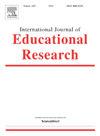Unlocking academic potential: Role of individual agency in diverse social environments
IF 2.5
3区 教育学
Q1 EDUCATION & EDUCATIONAL RESEARCH
引用次数: 0
Abstract
Educational inequalities persist and are prevalent in the modern world. While disadvantaged students encounter many structural barriers, the latest research highlights that individual agency could be a pathway to reduce the social class education gap. To provide a more comprehensive understanding of the interplay between students’ social origins and individual agency, this study tested four compelling hypotheses - independent, mediation, cumulative and compensatory effect hypotheses - on their role in shaping social class educational inequalities using multiple indicators of both constructs. The study draws on two-wave data from 1087 (51.4 % girls) middle school students attending 16 schools across Croatia. From the set of SES indicators, only parental education and occupational prestige were predictive of students’ academic achievement. Furthermore, results highlight mostly independent effects of students’ social origins and individual agency in determining their academic success. Additionally, educational aspirations served as a mediating factor, while both educational aspirations and motivational autonomy played a compensatory role in determining students’ academic success.
释放学术潜力:个体代理在不同社会环境中的作用
在现代世界,教育不平等现象依然普遍存在。虽然弱势学生遇到了许多结构性障碍,但最新的研究强调,个人代理可能是缩小社会阶层教育差距的途径。为了更全面地了解学生的社会起源和个人代理之间的相互作用,本研究使用两个构式的多个指标测试了四个令人信服的假设——独立效应、中介效应、累积效应和补偿效应假说——它们在形成社会阶级教育不平等中的作用。该研究利用了克罗地亚16所学校1087名中学生(51.4%为女生)的两波数据。从社会经济地位指标集来看,只有父母教育程度和职业声望对学生学业成绩有预测作用。此外,研究结果强调了学生的社会出身和个人代理在决定其学业成功方面的独立影响。此外,教育愿望对学生学业成功起中介作用,而教育愿望和动机自主对学生学业成功起补偿性作用。
本文章由计算机程序翻译,如有差异,请以英文原文为准。
求助全文
约1分钟内获得全文
求助全文
来源期刊

International Journal of Educational Research
EDUCATION & EDUCATIONAL RESEARCH-
CiteScore
6.20
自引率
3.10%
发文量
141
审稿时长
21 days
期刊介绍:
The International Journal of Educational Research publishes regular papers and special issues on specific topics of interest to international audiences of educational researchers. Examples of recent Special Issues published in the journal illustrate the breadth of topics that have be included in the journal: Students Perspectives on Learning Environments, Social, Motivational and Emotional Aspects of Learning Disabilities, Epistemological Beliefs and Domain, Analyzing Mathematics Classroom Cultures and Practices, and Music Education: A site for collaborative creativity.
 求助内容:
求助内容: 应助结果提醒方式:
应助结果提醒方式:


